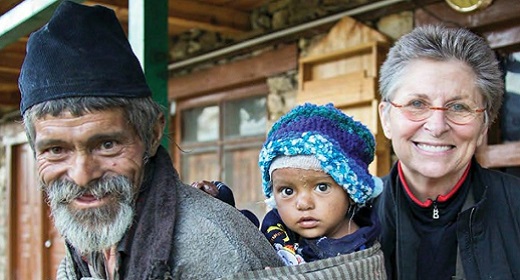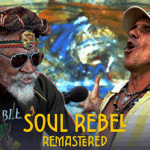by Frank Ostaseski: What have I learned from companioning 1000 people on the precipice of death?
Death is not primarily a medical event. Believing the most we can hope for is to make the best of a bad situation lacks imagination. Too many people die in distress, guilt, and fear. We can and should do something to encourage another possibility.
Many people, ordinary people, develop profound insights and engage in a powerful process of transformation near the end of their lives. One through which they emerge as someone larger, more expansive, more essential and real than the small, separate selves they had previously taken themselves to be. This is not a fairy-tale happy ending that contradicts the suffering that came before, but rather a recognition that transformation is possible even in tragedy. The discovery of this capacity regularly occurs for many people in the final months, days, or sometimes even minutes of life.
“Too late,” you might say. And I might agree. However, the value is not in how long they enjoyed the experience, but in the possibility that such transformation exists.
If that possibility exists at the time of dying, it exists here and now.
Death is not waiting for us at the end of a long road. Death is always with us, in the marrow of every passing moment. She is the secret teacher hiding in plain sight. She helps us to discover what matters most. And the good news is we don’t have to wait until the end of our lives to realize the wisdom that death has to offer.
To imagine that at the time of our dying we will have the physical strength, emotional stability, and mental clarity to do the work of a lifetime is a ridiculous gamble. And so, I want to extend an invitation—five invitations, actually—to sit down with death now, to have a cup of tea with her, to let her guide you toward living a more meaningful and loving life.
Over the past thirty years, as the co-founder of the Zen Hospice Project, people who were dying generously invited me into their most vulnerable moments. They made it possible for me to get up close and personal with death. In the process, they taught me how to live. I distilled their wisdom into five heart lessons for living fully and without regret.
1. Don’t Wait.
When people are dying, it is easy for them to recognize that every minute, every breath counts. But the truth is, death is always with us. Everything is constantly changing. Nothing is permanent.
This idea can both frighten and inspire us. Yet, embracing the truth of life’s precariousness helps us to appreciate its preciousness. We stop wasting our lives on meaningless activities. We learn to not hold our opinions, our desires, and even our own identities so tightly. Instead of pinning our hopes on a better future, we focus on the present and being grateful for what we have in front of us right now. We say, “I love you” more often. We become kinder, more compassionate and more forgiving.
2. Welcome Everything; Push Away Nothing
In welcoming everything, we don’t have to like what’s arising or necessarily agree with it, but we need to be willing to meet it, to learn from it. The word welcome confronts us; it asks us to temporarily suspend our usual rush to judgment and to be open, to what is showing up at our front door. To receive it in the spirit of hospitality.
A friend of mine was once invited for dinner at the home of a renowned psychiatrist named Sidney. Sidney was a man of unusual intelligence, insight, and grace. However, in the few years prior to this dinner, his Alzheimer’s disease had taken a toll on his short-term memory and ability to recognize faces.
When my friend arrived, she rang the doorbell, and Sidney opened the door. At first, he had a look of confusion. He quickly recovered and said, “I’m sorry. I have trouble remembering faces these days. But I do know that our home always has been a place where guests are welcome. If you are here on my doorstep, then it is my job to welcome you. Please come in.”
At the deepest level, this invitation is asking us to cultivate a kind of fearless receptivity.
3. Bring Your Whole Self to the Experience
We all like to look good. We long to be seen as capable, strong, intelligent, sensitive, spiritual, or at least well-adjusted. Few of us want to be known for our helplessness, fear, anger, or ignorance.
Yet more than once I have found an “undesirable” aspect of myself—one about which I previously had felt ashamed—to be the very quality that allowed me to meet another person’s suffering with compassion instead of fear or pity. It is not only our expertise, but exploration of our own suffering that enables us to build an empathetic bridge and be of real assistance to others.
To be whole, we need to include and connect all parts of ourselves. Wholeness does not mean perfection. It means no part left out.
4. Find a Place of Rest in the Middle of Things
We often think of rest as something that will come to us when everything else in our lives is complete: At the end of the day, when we take a bath; once we go on holiday or get through all our to-do lists. We imagine that we can only find rest by changing our circumstances.
There is a Zen story about a monk who is vigorously sweeping the temple grounds. Another monk walks by and snips, “Too busy.”
The first monk replies, “You should know there is one who is not too busy.”
The moral of the story is that while the sweeping monk may have outwardly appeared to the casual observer as “too busy,” actively performing his daily monastic duties, inwardly he was not busy. He could recognize the quietness of his state of mind, the part of himself that was at rest in the middle of things.
5. Cultivate “Don’t Know” Mind
This describes a mind that’s open and receptive. It is not limited by agendas, roles, and expectations. It is free to discover. When we are filled with knowing, when our mind is made up, it narrows our vision and limits our capacity to act. We only see what our knowing allows us to see. We don’t abandon our knowledge – it’s always there in the background should we need it – but we let go of fixed ideas. We let go of control.
The night before my open-heart surgery, my 26-year-old son Gabe and I had a tender conversation. Our sharing was filled with reminiscing, kindness, and laughter.
At one point, Gabe became quite serious and asked, “Dad, are you going to live through this surgery?”
Now I love my son beyond words, and like any father, I wanted to reassure him that I would be just fine. I felt into my experience before answering. Then I heard myself say, “I’m not taking sides.”
My answer surprised us both. What I meant was that I wasn’t taking sides with life or death. Either way, I trusted that everything would be okay. I don’t know where the words came from; they spilled from me without censorship. I wasn’t trying to appear sage or to be a good Buddhist. Yet we both were reassured by my response. I think it was because we knew we were in the presence of the truth spoken with love.
I view these lessons as five mutually supportive principals, permeated with love. Five bottomless practices that can be continually explored and deepened. They have served me as reliable guides for coping with death. And, as it turns out, they are equally relevant guides to living with integrity. To be understood, they need to be lived into and realized through action. They are five invitations for you to be fully present for every aspect of your life.










































